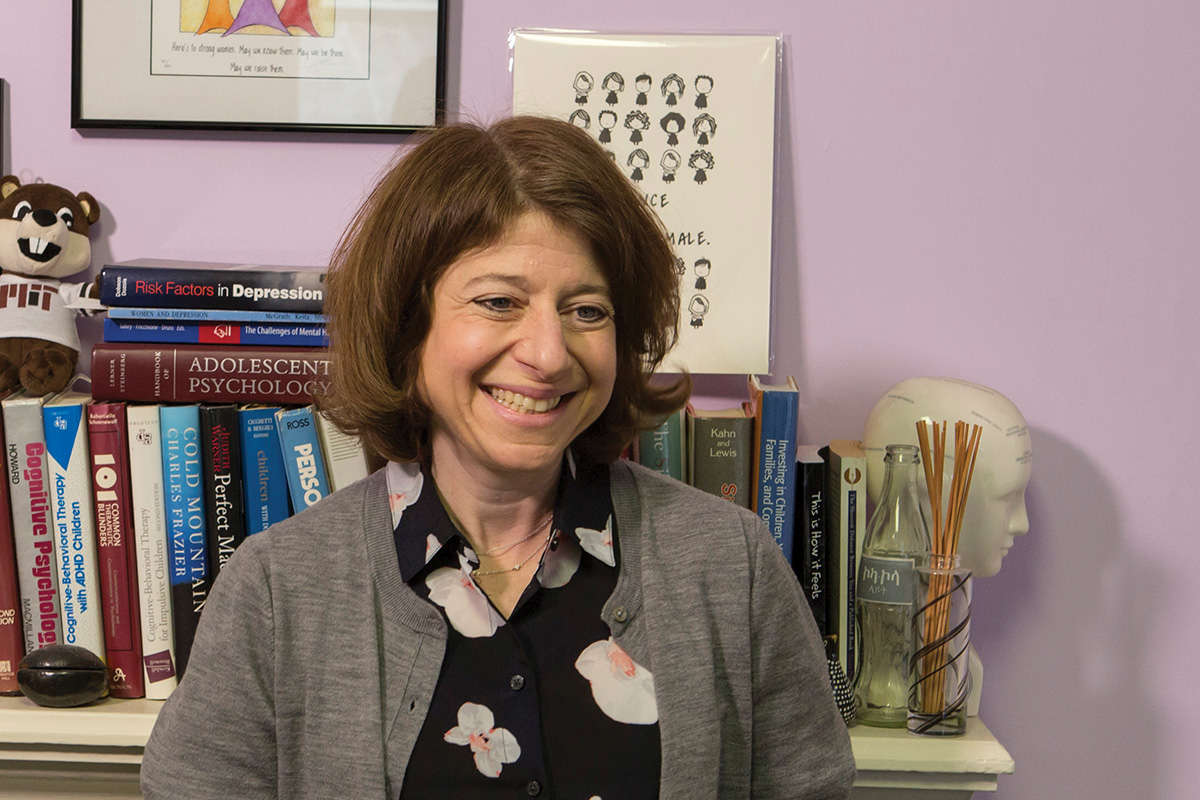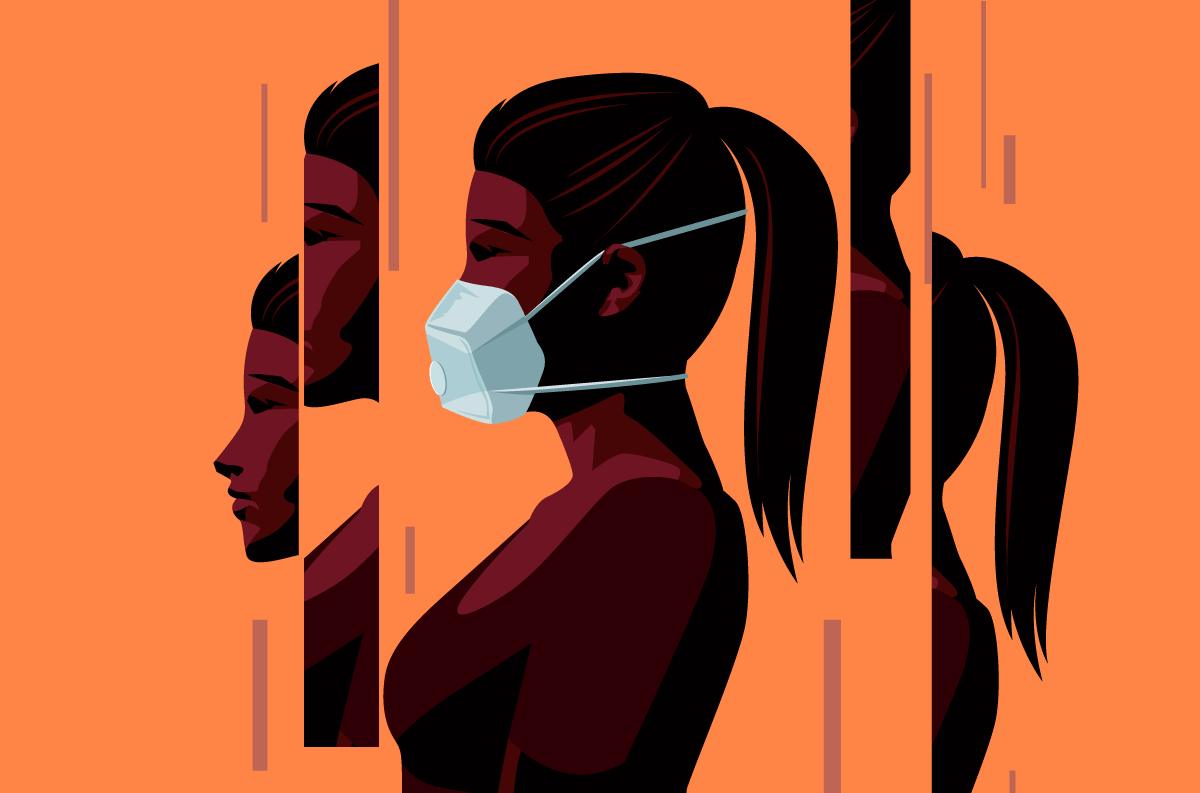
 From a study of how schools shortchange girls to our work on white privilege, these are some highlights from the past 50 years.
From a study of how schools shortchange girls to our work on white privilege, these are some highlights from the past 50 years.
 September 26, 2022
September 26, 2022
Mood Check offers resources that increase the school community’s mental health awareness and literacy, which serves as a prevention tool for adolescent depression.
 Senior Research Scientist Tracy Gladstone, Ph.D., and colleagues have been awarded nearly $7 million from the Patient-Centered Outcomes Research Institute.
Senior Research Scientist Tracy Gladstone, Ph.D., and colleagues have been awarded nearly $7 million from the Patient-Centered Outcomes Research Institute.
Middle school girls may be experiencing increased stress during the pandemic. Dr. Tracy Gladstone spoke with MetroWest Daily News about this concern and shared tips to combat stress.
 Tracy Gladstone, Ph.D., will take on a new role as research director to provide advice to research scientists at WCW.Tracy Gladstone, Ph.D., will support WCW’s research scientists through peer review of proposals, thought partnership in mapping research trajectories, and mentorship.
Tracy Gladstone, Ph.D., will take on a new role as research director to provide advice to research scientists at WCW.Tracy Gladstone, Ph.D., will support WCW’s research scientists through peer review of proposals, thought partnership in mapping research trajectories, and mentorship.
 October 8, 2020
October 8, 2020
The Path 2 Purpose campaign aims to help teens cope during the COVID-19 pandemic.
 July 14, 2020
July 14, 2020
At a time when teens are particularly vulnerable to anxiety and depression, the new funding will allow an additional group of teens to participate in an ongoing prevention study.

Our depression prevention research team will screen middle and high school students for symptoms of depression and anxiety, then compare that data with screenings done before COVID-19.
 A WCW research team conducts a pilot study to develop a depression prevention program for Wellesley College students.
A WCW research team conducts a pilot study to develop a depression prevention program for Wellesley College students.
 Tracy Gladstone, Ph.D., and colleagues identify a connection between youth and parents dealing with anxiety and depression.
Tracy Gladstone, Ph.D., and colleagues identify a connection between youth and parents dealing with anxiety and depression.
An online, self-guided depression prevention program co-created by WCW's Tracy Gladstone, Ph.D., has promising results.
Tracy Gladstone, Ph.D., associate director, senior research scientist, and director of the Robert S. and Grace W. Stone Primary Prevention Initiatives at the Wellesley Centers for Women (WCW), co-authored “Effect of Internet-Based Cognitive Behavioral Humanistic and Interpersonal Training vs. Internet-Based General Health Education on Adolescent Depression in Primary Care: A Randomized Clinical Trial.” Gladstone et al., 2018, published the study results in the Journal of American Medical Association (JAMA), highlighting the positive effects of the web-based CATCH-IT intervention on preventing depressive episodes among adolescents most at risk.
Linda Charmaraman, Ph.D., senior research scientist and director of the Youth, Media, & Wellbeing Research Lab at the Wellesley Centers for Women (WCW), presented with a panel of experts on social media and technology from infancy to young adulthood at the Pediatric Academic Societies meeting in Toronto, Canada. Based on her work with Megan Moreno, M.D., M.P.H., M.S.Ed., at the University of Wisconsin, Madison, and funded through Children and Screens: Institute of Digital Media and Child Development, the May talk focused on the psychosocial and physical health associations of early social media use before age 12.
The Wellesley Centers for Women (WCW) will partner with the University of Illinois at Chicago on a $7 million, multi-year project to evaluate and compare depression prevention programs for teens. Over $1.6 million of the award from the Patient-Centered Outcomes Research Institute (PCORI) will go to WCW.
Dr. Tracy Gladstone discusses a newly funded study that aims to prevent teen depression.
 September 18, 2018
September 18, 2018
The Wellesley Centers for Women will partner with University of Illinois at Chicago on a $7 million, multi-year project to evaluate and compare depression prevention programs for teens.

To help prevent depression before it starts, Tracy Gladstone and her colleagues developed a web-based program for at-risk teens.
Dr. Tracy Gladstone discusses CATCH-IT, a self-guided, internet-based intervention aimed at teenagers who are at risk for depression.
Collaborations and Communication: A School-Based Depression Prevention & Intervention Program
Depression is a common problem among adolescents. The average age for a first onset of depression is 15, and about 20 percent of teens will have experienced significant depressive symptoms by the time they are 18. Suicide is the second leading cause of death among adolescents in the U.S. Research indicates that 16 percent of U.S. adolescents report seriously considering suicide in a one-year period, and eight percent of U.S. adolescents report making a suicide attempt. Studies have found that more than 50 percent of adolescents who committed suicide had a mood disorder at the time. Building on her ongoing depression prevention and intervention work with adolescents, Gladstone and her clinical research team are working with two Greater Boston towns to pilot in-school screenings.
Tracy Gladstone, Ph.D., director of the Stone Primary Prevention Initiatives and associate director of the Wellesley Centers for Women (WCW), traveled to Ljubljana, Slovenia for the 47th Congress of the European Association for Behavioural and Cognitive Therapies in September 2017. She participated in a symposium, “Current Challenges and Future Directions in the Prevention of Youth Depression,” organized by colleagues in Germany, who were interested in Gladstone’s work on a primary care, internetbased depression prevention program for adolescents at risk for depression. This symposium brought together researchers who shared approaches to youth depression in different settings and discussed ways to adapt interventions for use in other cultures/countries. They also explored mechanisms that account for intervention success.
By Tracy R.G. Gladstone, Ph.D., WCW associate director and senior research scientist, director of the Robert S. and Grace W. Stone Primary Prevention Initiatives
According to the World Health Organization, depression is the leading cause of disability worldwide—it is the most common psychiatric disorder in the U.S., and is particularly common among lower income populations, and among women beginning in adolescence. The average age of onset for depression is 15, and about 20 percent of all people will have experienced an episode of depression by the end of adolescence. Youth depression is associated with a host of negative and long-term consequences, including poorer school performance, difficult peer and family relationships, increased risk of substance abuse, and poorer functional outcomes in adulthood. Of particular note is the connection between youth depression and suicide. Although not all people who commit suicide were depressed at the time, depression and suicidal behavior are indeed linked. Suicide is a tremendous problem in the U.S. and is the second leading cause of death among American adolescents.
 Tracy Gladstone, Ph.D., also traveled to Santiago, Chile in April 2015 where she presented at the inaugural symposium on the Prevention and Early Interventions in Mental Health focused on “Prevention of Depression: Translating Research Into Practice.” This is the first version of a series of biennial conferences that aims to develop new and/or updated strategies and action plans, and seek to broaden the support for evidence-based prevention and promotion in mental health in Chile and Latin America; it was organized by the Child And Adolescent Psychiatry Unit, Department of Psychiatry, University of Chile. Gladstone presented on the CATCH-IT program which utilizes an internet-based interactive system to prevent the onset of a depressive episode in at-risk teens.
Tracy Gladstone, Ph.D., also traveled to Santiago, Chile in April 2015 where she presented at the inaugural symposium on the Prevention and Early Interventions in Mental Health focused on “Prevention of Depression: Translating Research Into Practice.” This is the first version of a series of biennial conferences that aims to develop new and/or updated strategies and action plans, and seek to broaden the support for evidence-based prevention and promotion in mental health in Chile and Latin America; it was organized by the Child And Adolescent Psychiatry Unit, Department of Psychiatry, University of Chile. Gladstone presented on the CATCH-IT program which utilizes an internet-based interactive system to prevent the onset of a depressive episode in at-risk teens.
![]() Although surgical repair of fistula is associated with improvements in women’s quality of life and mental health, researchers have found even after being treated surgically to repair their fistula, many women still have difficulty engaging in family and community life. Tracy Gladstone, Ph.D., Senior Research Scientist and Director of the Stone Primary Prevention Initiatives at WCW, traveled to Gondar, Ethiopia where she trained nurses to implement a new evidence-based depression prevention program being piloted at the University of Gondar Fistula Center. After initial planning meetings in Spring 2014, Gladstone and her team conducted onsite interviews in December with clinicians as well as patients who shared their knowledge about fistula; they talked about their current social support and coping strategies and expressed an interest in learning skills to manage their worries and feel better. After developing a protocol, Gladstone returned to Ethiopia in March 2015 and trained the clinicians (pictured below), providing follow-up support via web-based communications as the hospital team readied for implementation. This spring, data from the first two cohorts who took part in the cognitive behavioral therapy program, and from the clinicians who led the initiative at the hospital, have resulted in promising positive outcomes—depression symptom scores decreased substantially. Further program details will be included in the Fall/Winter issue of the Research & Action Report.
Although surgical repair of fistula is associated with improvements in women’s quality of life and mental health, researchers have found even after being treated surgically to repair their fistula, many women still have difficulty engaging in family and community life. Tracy Gladstone, Ph.D., Senior Research Scientist and Director of the Stone Primary Prevention Initiatives at WCW, traveled to Gondar, Ethiopia where she trained nurses to implement a new evidence-based depression prevention program being piloted at the University of Gondar Fistula Center. After initial planning meetings in Spring 2014, Gladstone and her team conducted onsite interviews in December with clinicians as well as patients who shared their knowledge about fistula; they talked about their current social support and coping strategies and expressed an interest in learning skills to manage their worries and feel better. After developing a protocol, Gladstone returned to Ethiopia in March 2015 and trained the clinicians (pictured below), providing follow-up support via web-based communications as the hospital team readied for implementation. This spring, data from the first two cohorts who took part in the cognitive behavioral therapy program, and from the clinicians who led the initiative at the hospital, have resulted in promising positive outcomes—depression symptom scores decreased substantially. Further program details will be included in the Fall/Winter issue of the Research & Action Report.
For Immediate Release: January 21, 2014
The Needham Times, September 16, 2013
Tracy Gladstone
April 20, 2011
The Wellesley Centers for Women (WCW) at Wellesley College, with the University of Illinois Chicago (UIC), has received funding from the National Institute of Mental Health, National Institutes of Health for a multi-site study to evaluate a primary care/Internet-based depression prevention program for at-risk adolescents and their families.